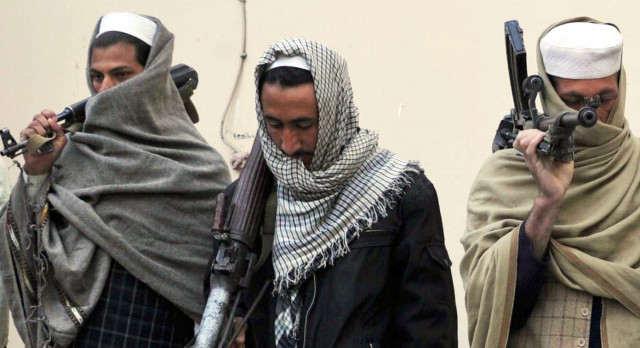Taliban office brings new hopes for reconciliation
The office is a belated response to Karzai regime’s calls for such a facility.

The office is a belated response to Karzai regime’s calls for such a facility. PHOTO: AFP / FILE
The opening of the Afghan Taliban political office in Qatar has raised hopes for reconciliation efforts in war-torn Afghanistan as the United States and Taliban have for the first time publicly announced to hold direct peace talks.
The US and the Taliban were involved in secret exploratory talks in Qatar until March last year when militants suspended the dialogue process over what they called Washington’s ‘non-serious approach and backing out of its pledges’.
The Afghan government had always insisted on a Taliban address to contact them for any talks ahead of the North Atlantic Treaty Organization (Nato) troops withdrawal in 2014. The opening of Taliban office in Qatar was a belated response to Karzai regime’s calls for such a facility.
President Karzai agreed to the opening of the Taliban office in the oil-rich Gulf state after some of his conditions were accepted during a visit to Doha, an Afghan diplomatic source, privy to the discussions, said.
The idea of the Taliban office was first floated at the Afghan-Pakistan-Turkey trilateral summit in Istanbul nearly three years ago and Turkey had reportedly agreed to host the Taliban. However, Pakistan and Afghanistan did not respond positively, the diplomat added. Taliban sources say they were also unwilling to establish an office in Turkey since the country is part of Nato.
Karzai was angry when secret contacts between the US and Taliban in Qatar were disclosed to him by then US Secretary of Defence Robert Gates. The US and Taliban had never wanted to disclose their contacts to the media, however, in order to avoid any misunderstanding the Americans shared the information with the Afghan government.
Following the disclosure, an upset Karzai announced at a news conference in Kabul in 2011 that the Taliban and the US are holding talks in Qatar. In protest, Karzai withdrew his ambassador to Doha as Qataris had also been silent about the matter.
Annoyed at Karzai’s disclosures, Robert Gates then had no option but to confirm US contacts with the Taliban.
The Taliban were not united on the issue of peace talks and some commanders announced two splinter groups - Dadullah Mahaz and Fidaye Mahaz, who publicly opposed any talks with the US and said they would fight until all foreign troops leave.
When the Taliban office was formally inaugurated this week, the Karzai-backed peace council welcomed the move as a step towards peace and reconciliation. It also announced that the peace council will soon send a delegation to Qatar.
The US also announced direct talks with the Taliban in the Qatar office just hours after the inauguration. Hamid Karzai’s regime, however, made an abrupt announcement to suspend talks on the security pact with the US, accusing it of contradictions in its approach towards the peace process.
Kabul, in fact, showed anger at the US’ intention of direct talks with the Taliban and some vague statements by Taliban representatives in Qatar that talks with the Afghan side will come later - after some sort of deal is made with the Americans, who they (Taliban) call ‘the real party to the conflict’.
Taliban spokespersons Dr Mohammad Naeem and Suhail Shaheen separately told The Express Tribune from Doha that in the first stage of talks, the US invasion and the Taliban prisoners in US custody would be discussed. They also said the stage of talks with all Afghans will come later when they will discuss the future structure of Afghanistan following the troops’ withdrawal.
Karzai and his peace council were unimpressed with this approach and wanted direct talks, a notion unacceptable at this stage for the Taliban and most likely, for the US as well.
The Afghan government’s approach cannot be disputed as it is the Afghans who will ultimately decide the future of their country after the pullout. It is not an appropriate time for the US and Pakistan to serve their interest in Afghanistan or to sideline Karzai, who they had never been on good terms with because of his repeated public outbursts against the two countries.
Karzai must also be aware that his decision to boycott the Qatar peace process could harm the yet-to-start dialogue process as he could be the main loser. Afghanistan needs a peace deal before 2014 to avoid repetition of a civil war like that after the Soviet withdrawal in the early 90s.
Published in The Express Tribune, June 22nd, 2013.



















COMMENTS
Comments are moderated and generally will be posted if they are on-topic and not abusive.
For more information, please see our Comments FAQ